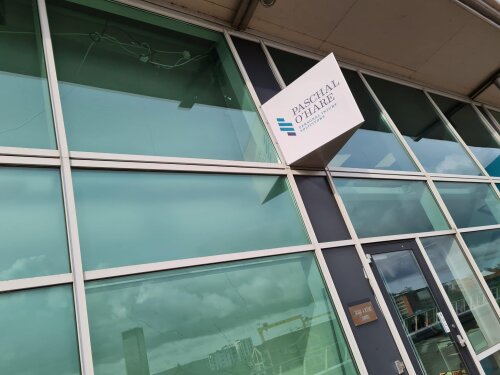Best Workers Compensation Lawyers in Belfast
Share your needs with us, get contacted by law firms.
Free. Takes 2 min.
List of the best lawyers in Belfast, United Kingdom
About Workers Compensation Law in Belfast, United Kingdom
In Northern Ireland there is not a single, government-run "workers compensation" scheme like in some other countries. Instead, people injured at work or who develop an occupational disease usually rely on a combination of routes: a civil claim against an employer or another negligent party, statutory benefits for work-related injury or illness, employer liability insurance, and employment law protections. Employers must meet health and safety duties and carry employers' liability insurance for most workplaces. Enforcement and workplace safety regulation in Northern Ireland is carried out by the Health and Safety Executive for Northern Ireland. If you are injured at work in Belfast you may therefore be pursuing a personal injury claim, a claim for statutory benefits, or both, depending on the facts.
Why You May Need a Lawyer
Many workplace injury cases are straightforward and can be resolved without formal legal action, but there are common situations where specialist legal help is important. You may need a lawyer if your employer disputes liability or says the injury was your fault, if your injury is serious or permanent, if you have an occupational disease with complex medical causation, if insurers offer a low settlement, if you face dismissal or discrimination linked to the injury, or if a family member has died and dependents seek a fatal-injury claim. Lawyers can help gather evidence, arrange medical expert reports, calculate current and future losses, negotiate with insurers, represent you at court or tribunal, and ensure you meet strict time limits.
Local Laws Overview
Key local legal points to understand in Belfast and the wider Northern Ireland context include the following.
Health and safety duties - Employers must provide a safe place and system of work. The Health and Safety at Work legislation in Northern Ireland places duties on employers, managers and contractors to reduce workplace risks and to report certain workplace incidents.
Employers' liability insurance - Most employers are required to have employers' liability insurance to cover claims by employees who are injured or become ill because of work.
Civil claims for negligence - If an employer or a third party breaches their duty of care and this causes injury, the injured worker can usually pursue a civil claim for damages. Compensation can cover pain and suffering, lost earnings, future losses, medical treatment and care costs.
Statutory benefits - There are social security benefits and allowances that can assist people with work-related injury or disease. Northern Ireland's social security and benefits administration is handled locally and there may be specific benefit schemes for industrial injuries.
Limitation periods - Time limits apply to bring civil claims. In most personal injury cases the general time limit is three years from the date of the injury or from the date of knowledge that the injury was caused by negligence. Different rules can apply for children, for people lacking capacity and in certain other circumstances.
Employment protections - If an employer unfairly dismisses or discriminates against someone because of their injury or disability, there are employment law remedies. For dispute resolution on employment rights and workplace relations there are local bodies that provide conciliation and advice.
Frequently Asked Questions
Can I bring a claim if I was injured at work in Belfast?
Yes, if your injury was caused or materially contributed to by your employer's negligence or the negligence of a third party, you can usually bring a civil claim for damages. You may also be able to claim statutory benefits for work-related injury or illness. It helps to seek advice early so you can understand the best route in your case and preserve evidence.
How long do I have to start a claim?
Limitation rules vary, but for most personal injury claims the normal time limit is three years from the date of the accident or from the date you knew the injury was linked to negligence. There are special rules for children, people without capacity and some occupational disease claims, so get legal advice promptly to avoid losing your right to claim.
What should I do immediately after a workplace accident?
Get medical attention and follow medical advice. Notify your employer and ask for an incident report to be made. Take photographs of the scene and any injuries if safe to do so. Collect names and contact details of witnesses, keep payslips and any sick notes, and keep a diary of symptoms and impacts on daily life. Do not sign anything without getting legal advice if you are unsure.
What if my employer denies responsibility or says it was my fault?
Disputes over liability are common. A solicitor experienced in workplace injury will investigate evidence such as accident reports, training records, maintenance logs, safety inspections and witness statements. Medical reports and expert evidence may also be needed. Many cases settle after negotiation, but some require court proceedings to resolve liability.
What compensation can I claim?
Compensation may cover general damages for pain and suffering, and special damages for financial losses such as past and future loss of earnings, medical and rehabilitation costs, care and assistance, equipment and adaptations, and loss of pension rights. In fatal cases dependents may claim for bereavement and loss of financial support. Each claim is tailored to the individual's losses and prognosis.
Can I get help if I developed an occupational disease over many years?
Yes. Occupational disease claims can be more complex because they often involve long latency periods and establishing causation between work and the illness. Early legal help is important to identify liable employers, insurers and to preserve historical evidence. Different limitation rules can apply, so seek advice as soon as you suspect the disease is work related.
Will I have to pay high legal fees?
Many solicitors offer conditional-fee or no-win no-fee arrangements for personal injury cases. Funding options vary and are regulated. Solicitors should explain fees and funding clearly at the first meeting, including whether you may need insurance for adverse costs if the case is unsuccessful. Always ask for a written costs agreement before proceeding.
Can my employer punish me for making a claim?
No. It is unlawful for an employer to victimise or dismiss someone because they have made or proposed to make a personal injury claim. If you face dismissal or discriminatory behaviour related to your injury you may have employment claims. Keep records of any adverse treatment and get advice promptly.
What happens if my employer had no insurance?
Most employers must have employers' liability insurance. If an employer does not have insurance and you have a valid claim, you can still pursue the employer directly. In some circumstances other parties, such as a contractor or a supplier, may be liable. A solicitor can help trace insurance or identify alternative defendants and advise about the practicalities of recovery.
How long will a claim take to resolve?
Timing varies greatly. Some claims settle in a few months, while more complex or contested cases can take a year or longer. The seriousness of injuries, the need for medical evidence, attempts to negotiate, and whether court proceedings are required all affect the timeline. Your solicitor should give a realistic estimate after an initial assessment.
Additional Resources
Health and Safety Executive for Northern Ireland - the regulator for workplace health and safety in Northern Ireland. Report serious workplace incidents to them where appropriate.
Department responsible for benefits in Northern Ireland - for information about statutory benefits and industrial injury payments that may be available after a work-related accident or disease.
Labour Relations Agency - offers advice and conciliation on workplace disputes and employment relations in Northern Ireland.
Citizens Advice Northern Ireland - practical advice on benefits, employment rights and how to get help after an injury at work.
Law Society of Northern Ireland - the professional body for solicitors. Use it to check a solicitor's credentials and to find a solicitor who specialises in personal injury and workplace claims.
Northern Ireland Courts and Tribunals Service - information on court procedures if a claim proceeds to litigation or if there is a related inquest.
Next Steps
1. Seek immediate medical attention and follow medical advice. Keep records of all treatment, sick notes and medical correspondence.
2. Inform your employer and ensure an incident report is completed. Keep copies of all internal reports and correspondence.
3. Collect evidence where safe to do so - photographs, witness names and contact details, equipment or environment details, payslips and contracts.
4. Contact an experienced solicitor who specialises in workplace injury and occupational disease. Ask about funding options, likely timeframes, and the solicitor's experience with similar cases.
5. Report hazards or serious incidents to the appropriate regulator when necessary and seek independent advice from organisations such as the Labour Relations Agency or Citizens Advice.
6. Be aware of time limits for making a claim and take timely action to protect your rights. If you are unsure about deadlines, get legal advice promptly.
Important note - This guide provides general information and does not constitute legal advice. For advice tailored to your situation consult a solicitor regulated by the Law Society of Northern Ireland.
Lawzana helps you find the best lawyers and law firms in Belfast through a curated and pre-screened list of qualified legal professionals. Our platform offers rankings and detailed profiles of attorneys and law firms, allowing you to compare based on practice areas, including Workers Compensation, experience, and client feedback.
Each profile includes a description of the firm's areas of practice, client reviews, team members and partners, year of establishment, spoken languages, office locations, contact information, social media presence, and any published articles or resources. Most firms on our platform speak English and are experienced in both local and international legal matters.
Get a quote from top-rated law firms in Belfast, United Kingdom — quickly, securely, and without unnecessary hassle.
Disclaimer:
The information provided on this page is for general informational purposes only and does not constitute legal advice. While we strive to ensure the accuracy and relevance of the content, legal information may change over time, and interpretations of the law can vary. You should always consult with a qualified legal professional for advice specific to your situation.
We disclaim all liability for actions taken or not taken based on the content of this page. If you believe any information is incorrect or outdated, please contact us, and we will review and update it where appropriate.














